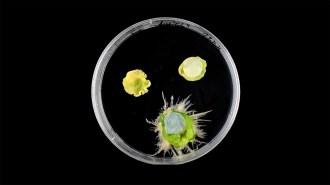They fertilized with what?
Talk about your high yuck factor. Researchers in Finland have just published results of a study showing that farmers can substitute human urine for conventional fertilizer and get a notable increase in cabbage yields.

Surendra K. Pradhan of the University of Kuopio and his colleagues grew cabbages using a conventional fertilizer, human urine that had been stored for 6 months, or no soil amendment at all. In an upcoming issue of the Journal of Agricultural and Food Chemistry, the researchers report that the urine treatment yielded cabbages that were bigger and carried fewer germs than those grown by either other approach.
Although the nutrient content of urine depends on what someone has eaten, analyses of the urine used in these experiments showed that its nitrogen, phosphorus, and potassium contents were comparable to those of commercial fertilizer.
Urine collected from one individual over the course of a year could fertilize a 90-square-meter plot, yielding more than 160 cabbages, the team calculates. The data indicate that a urine-treated plot would yield 64 kilograms more cabbage than one fertilized conventionally.
Earlier this year, the Kuopio scientists reported that cucumbers benefit from the use of urine as fertilizer.






